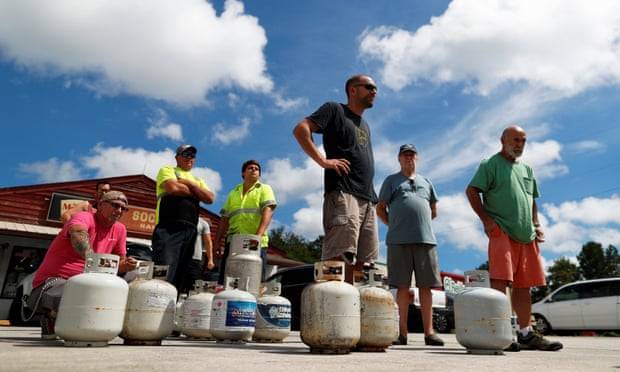Hurricane Florence is expected to bring potentially catastrophic winds, flooding and storm surge. Forecasters predict it will make landfall sometime late Thursday.
Currently rated as a category 4 storm – the second most powerful on the national weather service’s (NWS) classification system – Florence would be the first storm of that magnitude in recorded history to strike the eastern coastline so far north if it remains on its most likely track.
In its latest advisory, the US national hurricane center (NHC) said the storm is expected to be an extremely dangerous major hurricane through Thursday.
Florence “is particularly big, particularly strong and ... there’s nothing stopping it,” the South Carolina governor Henry McMaster said at a news conference on Monday. “And when it hits the Gulf Stream in warmer water, it’s going to [intensify] even more.”
McMaster ordered the evacuation of coastal areas to start at noon on Tuesday as Hurricane Florence approaches. He said the storm surge could reach as high as 10ft (3m) and estimated that 1 million residents would be leaving the coast.
“We know this evacuation order I’m issuing is going to be inconvenient,” McMaster said of the decision. “But we’re willing to suffer some inconvenience.” He added that the disruption was worth the effort to save lives.
“This is a big, big hurricane,” McMaster said, noting that wind speeds are predicted to be more violent than in either of the the region’s two most damaging storms of the past 30 years.
Virginia’s governor ordered a mandatory evacuation for some residents of low-lying coastal areas beginning on Tuesday morning. State officials say 245,000 people live in the affected area, but officials warned the storm could affect the entire state.
McMaster declared a state of emergency on Saturday. The governors of Virginia, North Carolina and Maryland have done the same. The designation gives officials the power to do order evacuations, establish shelters, prohibit travel and impose curfews.
“Take steps now,” said North Carolina governor Roy Cooper over the weekend. On Monday he said: “We do know that we’re in the bull’s-eye.”
On Monday afternoon, Donald Trump cancelled a scheduled appearance for Friday in Jackson, Mississippi. He was due to campaign for Senate candidate Cindy Hyde-Smith.
The NWS is predicting “life-threatening” storm surge and inland freshwater flooding, with some models predicting upwards of 2ft of rainfall. With winds of up to 150mph forecast, Florence will likely fell tree limbs and trigger power outages.
Advertisement
Some forecasters are concerned that the storm appears likely to slow dramatically at about the time of landfall, like 2017’s Hurricane Harvey, which stalled out Houston, dropping huge amounts of rain over several days. That storm brought $125bn in damage last summer, mostly in Texas.
Florence stands a significant chance of joining 2017’s Harvey and Irma as just the third storm to make landfall on the US mainland at category 4 strength (or higher) since 2005. When storms of that magnitude hit the lower 48 states, they usually travel through the warmer waters of the Caribbean and Gulf of Mexico and rarely make landfall so far north up the eastern Atlantic coast. The last storm to hit the Carolinas as a category 4 was Hurricane Hugo nearly 30 years ago in 1989.
Florida governor Rick Scott, whose state experiences the most hurricane-force storms in the US, pledged resources, expertise and guidance to the three states in which emergencies have been declared.
Officials in North Carolina have already issued mandatory evacuation orders for coastal Dare County and Hatteras Island. The governor also waived certain restrictions for trucks and heavy vehicles to help farmers harvest crops and move livestock before the storm, officials said.
“North Carolina is no stranger to hurricanes,” Cooper said Monday, at least partially alluding to the devastating effects of Hurricane Matthew, which struck the Carolinas as a category 1 storm in October 2016 killing 34 in the US, after cutting a vicious path across the Caribbean, killing more than 1,000 in Haiti.
Off the state’s coast, large sea swells and dangerous rip currents were already apparent over the weekend, foreshadowing the storm’s arrival. Beachgoers have been warned to avoid the ocean, and ferries that service the state’s coast have been canceled.
In Virginia, home to the world’s largest sea base, the US navy has ordered all ships to sea in preparation for the storm, where they can more safely ride out the violent wind and waves.
More about: #Hurricane-Florence
















































